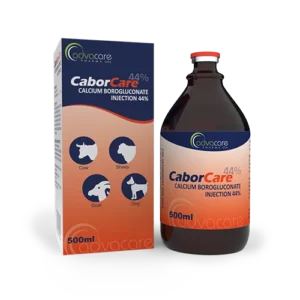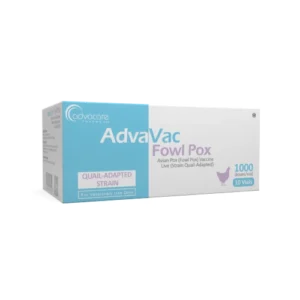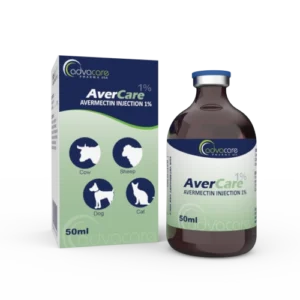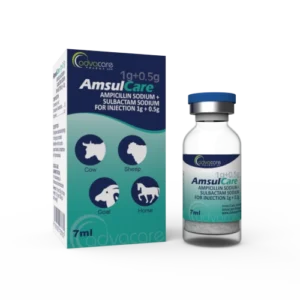What is Gentamicin Sulfate?
- Antibiotic
- Cat,
- Dog,
- Cow,
- Goat,
- Pig,
- Poultry,
- Sheep,
- Horse
Active Ingredients: Gentamicin Sulfate
Gentamicin Sulfate Injection is a drug used to treat severe bacterial infections, such as endocarditis, pneumonia, mastitis, and urinary tract infections. This antibiotic may be used to prevent the development of drug-resistant bacteria. Gentamicin sulfate is also prescribed as prophylaxis for surgery.
This drug may be administered to help improve conception for mares with uterine infections. As an aminoglycoside antibiotic, it exerts its bactericidal action by targeting the bacterial ribosomes, specifically the 30S subunit, thus interfering with protein synthesis. It shows activity against both gram-positive and gram-negative bacteria. This disruption in protein production results in the inhibition of bacterial growth and replication.
Gentamicin Sulfate Injection is suitable for a wide range of species, including cats, dogs, goats, sheep, horses, poultry and pigs.
It is important to note that Gentamicin Sulfate Injection is for veterinary purposes only. Although there are similar medications available for humans, this particular formulation is recommended to be prescribed by a veterinary doctor or animal care specialist for an animal.
Gentamicin is not a rare antibiotic for human use; in fact, it is a well-established antibiotic in human medicine. It is widely employed to treat a range of bacterial infections, including urinary tract infections, respiratory infections, and certain types of sepsis. Human formulations of gentamicin are readily available in various forms, including intravenous and intramuscular injections, topical creams, and ointments. However, this formulation is only for veterinary use.
AdvaCare Pharma is a global supplier of Gentamicin Sulfate Injection. AdvaCare excels at the production of high-quality yet cost-effective livestock treatments. This veterinary medicine has been manufactured in our GMP-certified facilities located in China, India, and the USA.
Why are we a trusted Gentamicin manufacturer?
Gentamicin Injection is manufactured and globally distributed by AdvaCare Pharma, a leading manufacturer of veterinary injections in the pharmaceutical industry. We have been committed to distributing high-quality, GMP-certified veterinary medications for the global market over the past 20 years. As a top Gentamicin manufacturer, we ensure that all of our 100+ veterinary injections surpass our distributors’ requirements by conducting routine internal and third-party facility audits.
Precautions
Do NOT use Gentamicin Sulfate Injection for an animal that:
- has a known allergy or hypersensitivity to any of the ingredients.
- is dehydrated.
- has kidney problems.
- has preexisting hearing or vestibular (balance) impairments.
- is pregnant or lactating (without careful evaluation).
- has a known history of severe gastrointestinal disorders.
There are known interactions between gentamicin sulfate and other drugs, including omeprazole, acetylsalicylic acid (ASA/aspirin), and ibuprofen. It may also interact with diuretics such as furosemide, which can increase the risk of kidney damage when used concurrently.
What are the most common animals Gentamicin Sulfate Injection is used for?
Many veterinary professionals use Gentamicin Sulfate Injection on the following types of animals:
- Cattle: Gentamicin Sulfate Injection is commonly used in cattle for the treatment of infections, such as pneumonia, septicemia, and infections caused by E. coli. Its use is typically reserved for situations where other antibiotics have failed or are ineffective due to resistance patterns.
- Pigs: In pigs, it is used in young piglets to combat diseases the likes of bacterial enteritis and pneumonia caused by pathogens susceptible to gentamicin.
- Dogs: For dogs, Gentamicin Sulfate is often utilized to treat infections affecting the skin, ear, and urinary tract. The medication may be used in conjunction with other treatments, such as topical therapy or oral antibiotics, depending on the location and severity of the infection.
- Cats: The drug may be used for similar indications as in dogs, treating systemic bacterial infections. Because of the potential for side effects, including nephrotoxicity and ototoxicity, its use is carefully weighed against the benefits and typically reserved for cases where other antibiotics are not suitable.
- Horses: Gentamicin Sulfate Injection is used for the treatment of respiratory tract infections, wound infections, and abdominal infections caused by gram-negative bacteria. It’s often part of a combination therapy, especially in critical cases where broad-spectrum coverage is needed.
Uses
What is Gentamicin Sulfate used for?
It’s used to treat bacterial infections such as:
- blood poisoning
- uropoiesis
- reproductive system infection
- respiratory tract infection
- alimentary infection (including peritonitis)
- infection of the biliary tract
- mastitis
- parenchyma infection
What animals can be treated with Gentamicin Sulfate Injection?
This drug is used to treat a range of animals including companion animals like cats and dogs, as well as larger animals such as horses. It is also indicated for use in livestock, including cattle, goats, sheep, and pigs.
How is Gentamicin Sulfate Injection used?
The liquid form of Gentamicin Sulfate Injection is administered parenterally, given directly into the bloodstream or muscle tissue, and bypassing the gastrointestinal tract for rapid absorption. The exact route of administration (subcutaneous, intravenous, or intramuscular) depends on the type and severity of the infection and the animal being treated.
How does Gentamicin Sulfate work against bacterial infections?
The drug interferes with bacterial protein synthesis by binding to the 30S subunit of the bacterial ribosome. This binding disrupts the integrity of the cell membrane and the production of vital proteins, leading to the death of the bacteria.
Can Gentamicin Sulfate be used for all types of bacterial infections?
Gentamicin Sulfate is primarily effective against aerobic gram-negative bacteria and some gram-positive bacteria, but it is not effective against anaerobic bacteria, fungi, or viruses. Bacterial culture and sensitivity testing should be done prior to administration.
Are there any contraindications or precautions associated with Gentamicin Sulfate?
Yes, there are. Gentamicin Sulfate should be used with caution in animals with pre-existing kidney problems, as it is known to be nephrotoxic. It can also cause ototoxicity.
Can Gentamicin Sulfate be combined with other medications?
This drug can be used in combination with other antibiotics to provide a broader spectrum of action. However, it may interact with other types of medications, such as diuretics, which can increase the risk of toxicity.
What is the withdrawal period for Gentamicin Sulfate?
The withdrawal time is 18 months or more for meat. The withdrawal period is the time required after the last administration of the medication before the animal can be slaughtered for food to ensure that residual drug amounts are not present in the meat.
How is the effectiveness of Gentamicin Sulfate monitored during treatment?
The animal should be observed for signs of improvement in the symptoms associated with the infection. Veterinarians may conduct periodic blood tests to monitor kidney function and drug levels in the bloodstream. Too low levels may not effectively treat the infection, and too high levels could lead to toxicity.
How should Gentamicin Sulfate Injection be stored?
This medication should be stored in a dark, dry location between 20-55°C. The vial should be sealed tightly. Exposure to light or extreme temperatures can lead to degradation of the antibiotic, rendering it less effective or even harmful.
Dosage
How much Gentamicin Sulfate Injection should be given to pigs?
For a 1-to-3-day-old piglet, the usual dose is 5mg, given once IM.
How much Gentamicin Sulfate Injection should be given to poultry?
For a 1-day-old chick, the usual dose is 0.2mg, given once SC in the neck.
How much Gentamicin Sulfate Injection should be given to dogs or cats?
The usual dose is 4.4mg/kg, given twice on the first day SC/IV/IM. Then, a dose of 4.4mg/kg once a day thereafter. The average duration of treatment is 5-7 days.
How much Gentamicin Sulfate Injection should be given to horses?
The usual dose is 20-25ml (2-2.5g gentamicin) per day for 3 to 5 days during estrus.
What should be done in case of underdosing or overdosing?
If an incorrect dose was given to the animal, contact the veterinarian immediately. Underdosing may lead to ineffective treatment and the potential for bacterial resistance, while overdosing can cause serious toxicity, including kidney damage and hearing loss, especially in species known to be sensitive to aminoglycosides like gentamicin. Symptoms of overdose may include loss of balance, disorientation, or lack of urine production in the case of kidney failure.
What must be done if a dose is missed?
Administer the dose as soon as remembered. Do not give the missed dose if it’s close to the next one and, instead, return to the regular dosing schedule. Do not double the dose to catch up. Maintaining consistent levels of the drug in the bloodstream is crucial for the success of the treatment.
Refer to a veterinary doctor or pharmacist for guidelines on dosage.
Side Effects
As with all pharmaceuticals, some unwanted effects can occur from the use of Gentamicin Sulfate Injection.
Serious side effects may include:
- allergic reaction (skin rash, fever, facial swelling, or difficulty breathing)
- vestibular function damage
- reversible renal toxicity
- ototoxicity (leading to hearing loss or balance issues)
- neurotoxicity (leading to muscle weakness or paralysis)
- gastrointestinal upset (vomiting, diarrhea, or loss of appetite)
If side effects occur after administering Gentamicin Sulfate Injection, immediately stop the medication and seek veterinary help. A professional will be able to assess the situation, provide treatment, and offer guidance on managing the outcomes effectively.
Signs of gentamicin toxicity may include a loss of appetite, lethargy, and weakness, potentially progressing to more serious symptoms such as hearing loss, unsteadiness, or acute kidney injury, indicated by changes in drinking and urinating habits.
For a comprehensive list of all possible side effects of this medication, consult a veterinarian.







